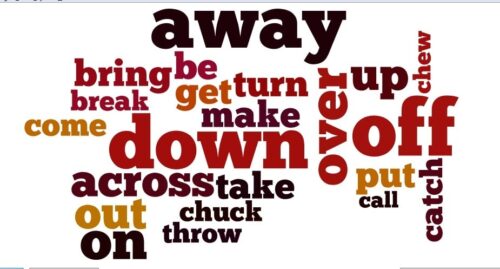15 Essential Phrasal Verbs for Upper Intermediate Level

As a teacher I dread the student request ‘we want to study phrasal verbs’ for the following reasons:
- The difficulty of deciding which phrasal verbs the students want to study and for what reason.
- The challenge of incorporating a body of phrasal verbs, all with different meanings and uses, into a communicative and coherent class plan.
For that reason I prefer to treat phrasal verbs as ‘opportunity’ teaching. This means finding (or ‘coming across’, if you prefer) phrasal verbs in context and drawing students’ attention to them, or introducing them at opportune moments. Even then, there can be complications when relatively obscure, literary or archaic examples (‘butter up’, or ‘chime in’ anyone?) ‘crop up’ in reading texts and it becomes necessary to explain that these are very unlikely to become a useful part of a learner’s active vocabulary, even at extremely high levels.
But then I think about the teacher’s role as a guide to the learner in showing the way to the really useful language that will help them become an effective and sophisticated user of English. This is perhaps especially relevant in the arcane field of phrasal verbs where learners are often found to be out of their comfort zones. For this reason I set myself the challenge of identifying the 15 essential phrasal verbs at upper intermediate level – assuming that basics such as ‘get up’ and ‘put on’ are already in place.
The result is the list below. So, if you are an English learner at an intermediate level you really should know these phrasal verbs and then be able to use them in context. If not, then here’s your chance to fill in the gaps in your knowledge!
If you, as a learner or a teacher, would replace any of my suggestions on this ‘definitive’ list, or would like to say anything else on the matter, please leave a comment in the box below!
| PHRASAL VERB | DEFINITION | EXAMPLE |
| To bring up | To introduce a topic | I knew he was going to bring up the 2014 results at the meeting |
| To carry on | To continue | I will carry on with the job after lunch. |
| To come up with | To have an idea | We need to come up with some solutions, fast! |
| To cope with | To manage / to withstand | In the end he changed jobs because he couldn’t cope with the pressure. |
| To deal with | To manage / to withstand / to have a relationship with (someone) | Do you deal with Susan directly? |
| To find out | to gain knowledge about something | I finally found out how to forward my mail from one email account to another. |
| To get on/along (with) | To have a good relationship | After a few weeks I found we actually got on quite well. |
| To get over (something) | to recover | I was upset that I didn’t get the promotion, but I got over it after a while. |
| To get rid of | To not possess any more | We really need to get rid of this old management system |
| To look forward to | to be excited about something in the future | I’m really looking forward to having an extended weekend next week. |
| To put (something) off | to postpone | I haven’t done my taxes yet. I’ve been putting it off for a long time |
| To put up with | To tolerate | We have had to put up with a lot of problems on this project. |
| To rule out | To discard | I think we can rule out the possibility of getting more news today. |
| To run out of | To have a decreasing or zero amount of something | The printer is running out of toner. |
| To sort (something) out | to organize or resolve a problem | There was some confusion with the new work schedule. No one is sure who works on Sunday. We’re calling a meeting to sort it out |







